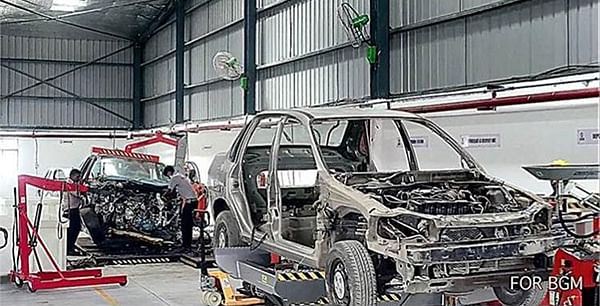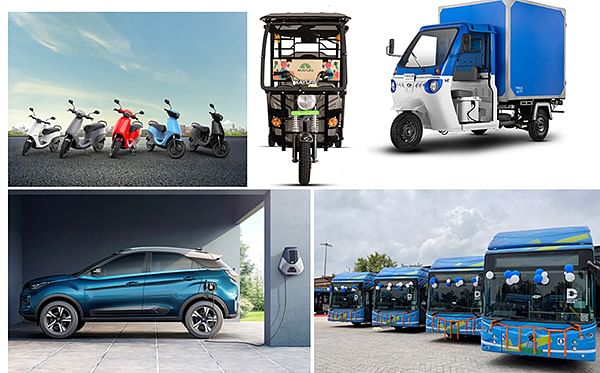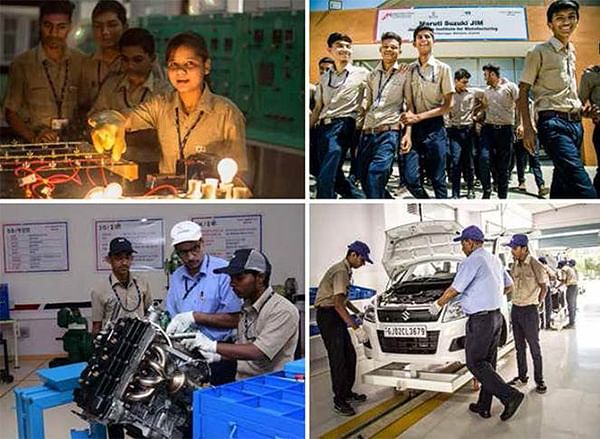Growth-oriented Budget to be demand accelerator for India Auto Inc
Demand-side measures with lowered direct taxes, infrastructure push and support to start-ups and MSMEs augur well to stimulate economy and drive growth for the automotive sector.
The Union Budget 2023-24, which was presented by Finance Minister Nirmala Sitharaman in the Parliament on February 1, comes out as a growth-oriented plan with emphasis on measures to stimulate demand as well as positively impact the supply chain to sustain momentum in the Indian economy.
The government maintained its focus to strengthen infrastructure development by increasing capital infusion by 33 percent to Rs 10,00,000 crore, and further allocated additional funds towards key sectors – railways and agriculture – while offering fiscal benefits to start-ups and MSMEs (micro-, medium- and small enterprises), opening new doors for them to flourish.
In a huge relief to the taxpayer, the government also increased the zero-income-tax slab from Rs 500,000 to Rs 700,000 and lowered the subsequent slabs in the ‘new’ Income Tax regime, enabling higher disposable incomes in the hands of citizens. The move has been widely applauded and labelled to bring a boost to the sentiment in the economic environment of the country.
Specifically for the automotive sector, it is being expected to bring a respite to the lower end of the vehicle industry, where sales of entry-level cars and two-wheelers have been struggling due to unaffordability of buyers at the bottom end of the pyramid.
 Increased incomes as a result of direct tax cuts is expected to act as a fillip for sale of entry level cars and fuel-efficient commuter two-wheelers.
Increased incomes as a result of direct tax cuts is expected to act as a fillip for sale of entry level cars and fuel-efficient commuter two-wheelers.
The Budget also allocated additional funds towards replacing old, end-of-life vehicles of the Central and State governments as well as old ambulances, and the step is clearly aimed at driving new vehicle sales.
While the Economic Survey forecasts a lowered GDP growth projection between 6.4 and 6.8% for FY2024 (FY2023: 7%), India is still poised to achieve the fastest growth among all major economies in the world. With the Budget’s growth-oriented agenda, there is a consensus in India Auto Inc that these measures which aim to turn the wheels of the economy will tremendously benefit the automotive industry and accelerate demand for vehicles.
What India Auto Inc says about Budget 2023-24
According to Shashank Srivastava, Senior Executive Officer, Maruti Suzuki India, “The planned capex at Rs 10 lakh crore is now 3.3% of the country’s GDP, and this is the highest it has ever been. It will positively impact consumption as well as supply sides of the economy. While in the short term, this will help generate demand, in the medium- and long-term future, it will help create capacities for further expansion, and indirectly generate more employment.”
Srivastava further told Autocar Professional that the reduction in income tax will result in higher disposable income in the consumer’s hands, “and therefore, it should lead to a higher propensity to spend.” However, he cautioned that inflation will be a key factor to watch out for as it will eventually dictate consumer spending.
“An automobile is a discretionary purchase and disposable income is not just income after taxes but also minus the inflation. Fortunately, the inflation projected for FY2024 is less both globally and particularly for India,” he added. Srivastava further red-flagged higher interest rates, crude oil, and commodity prices as well as geo-political issues which could impact vehicle exports from India.
Vinod Aggarwal, President, Society of Indian Automobile Manufacturers (SIAM), who echoed Srivastava’s views, said, “Lowering of effective personal income tax rates should increase consumption and consequently, lead to more demand for the automobile industry.”
Sunjay Kapur, President, Automotive Components Manufacturers Association of India (ACMA), said, “It was a good growth-oriented Budget, with a lot of positives in terms of infrastructure spending, circular economy, credit-guarantee schemes for MSMEs, older vehicle replacement, as well as focus on AI, and 5G, which are particularly positive moves for the manufacturing sector.”
Kapur also believes that the government’s encouragement towards the start-up ecosystem by offering them tax benefits will indirectly help the automotive industry as it increasingly deepens connect with start-ups as it goes towards embracing future mobility technologies.

Tax benefits for start-ups with indirectly help the automotive industry which is deepening its connect with them in the drive towards future mobility tech.
“Furthermore, the stress upon inclusive development, last-mile infrastructure, and green growth – these are all exciting for us as an industry, and everything adds up together with the existing PLI and FAME-II schemes. The exemption on customs duty for machinery to manufacture Li-ion battery cells for EVs is a step in the right direction and in line with the government’s broader roadmap of sustainability,” Kapur told Autocar Professional.
“There will likely be more domestic consumption due to lower tax rates which should put more money in the hands of the end consumer, and therefore result in better sales for the overall vehicle industry. I am very pleased with the Budget,” he added.
“The increase in capex on infrastructure and the emphasis on green growth will help the mobility sector. This Budget gives something to everyone – from rural India, start-up India, middle-class India, to digital India – it is about inclusive growth and building on the recovery we are seeing after the pandemic. It strikes a fine balance between growth and fiscal prudence,” said Sudarshan Venu, Managing Director, TVS Motor Company.
Arathi Krishna, Managing Director, Sundram Fasteners says, “The government has ensured that India advances and becomes a modern economy. The domestic automotive industry has significant growth potential, driven by a variety of factors, and in order to maintain momentum, the government has consistently prioritised technology connectivity, world-class infrastructure development, and an EV landscape. Furthermore, there is growing environmental concern, which is urging the government to promote green mobility. The government's explicitly realistic announcements will benefit industries such as manufacturing and sustainability.”
Manish Raj Singhania, President, Federation of Automotive Dealers Associations (FADA), commented, “There is a significant reduction in the income tax rates, which would therefore ensure higher disposable incomes. It is a big positive for the automotive industry and two-wheelers as well as entry-level cars will particularly benefit the most.
“The commercial vehicle (CV) industry is also set to benefit from the government’s infrastructure push and with vehicle dealers falling under MSMEs, the credit-guarantee scheme augurs well for the vehicle retail ecosystem,” he added.
 Budget 2023-24 allocates additional funds to scrap old, polluting vehicles in Central and State government fleets, which will lead to new vehicle purchase.
Budget 2023-24 allocates additional funds to scrap old, polluting vehicles in Central and State government fleets, which will lead to new vehicle purchase.
Building upon the Vehicle Scrappage Policy of 2021-22, the government also allocated more funds in the Budget to replace older and polluting vehicles in the Central and State government fleets. “For the Scrappage Policy to get implemented, the government must lead and they have clearly set an example. It will give a fillip to new car sales and will ensure lesser polluting and safer vehicles on the road,” Singhania told Autocar Professional.
According to Nikunj Sanghi, Managing Director, JS4Wheels, “While there might not be a very big cash surplus in the consumer’s hands, owing to the reduction in income taxes, the upside is that the move will generate a positive sentiment in the industry.
“The huge focus on infrastructure spending will generate income in the hands of people and the additional money that gets pumped in the economy will lead to more jobs, and it could spur demand. With a low fiscal deficit, there will not be too much of inflation, which is another positive for the economy,” Sanghi added.
Chetan Maini, Co-founder and Chairman of Sun Mobility, said: “I applaud the government’s continued efforts to accelerate the country’s transition to sustainable development and green growth, focusing on green fuels, energy, building practices and creating new ‘green’ jobs, besides leading to reduced carbon intensity. The allocation of Rs 35,000 crore for green transition is a huge step forward towards green growth. However, the industry looks forward for the government to share more insights about the capex allocation to support the commercial vehicle sector as part of the agenda. It is encouraging to see the government’s decision on viability gap funding for battery storage solutions and continuation of lower customs duty on lithium-ion cells. The scrappage of old government vehicles and budgetary allocation towards the same, is a positive step forward."
Maini added, "While this Budget is impactful, I feel that release of the Battery Swapping Policy, covering subsidies and GST rate rationalisation from 18% to 5% on EV batteries, would have added further to the green growth agenda.”

Localisation of EVs unplugged
To enable a greater offtake of electric vehicles (EVs) in line with its roadmap of sustainable growth and achieving carbon neutrality by 2070, the government also announced measures to drive localisation of electric vehicles (EVs) and their components in India. The Budget proposed to exempt custom duties on the import of raw material and machinery for manufacturing of lithium-ion battery cells for EVs.
“The focus on sustainability is a step in the right direction and it will consistently drive green mobility in the country,” said Santosh Iyer, Managing Director, Mercedes-Benz India. Moreover, the government also hiked the custom duty applicable on a completely-built-up (CBU) imported EV from 60% to 70%, as well as duty applicable on all semi-knocked down (SKD) vehicles (including EVs) from 30 to 35 percent. The duties on vehicles imported in the form of completely-knocked down (CKD) kits, however, remained stable at 10% in the Budget.
According to Iyer, “The change in basic custom duties is going to impact the prices of some of our select models like the S-Class Maybach (SKD), as well as CBUs like the GLB and EQB, making them dearer. However, as we locally manufacture most of our models, this will not affect 95 percent of our portfolio.”
 Skilling initiatives score high
Skilling initiatives score high
The Budget also focused on skill development and brought a huge push to the National Apprenticeship Programme with the government announcing fiscal support in terms of direct stipend transfers to 47 lakh youth over the next three years. “With the FY2023 target of direct-benefit transfer to 10 lakh youth close to getting accomplished, the new target looks very much feasible,” said Arindam Lahiri, CEO, Automotive Skills Development Council (ASDC).
The government also strengthened the digital skilling ecosystem in the country by announcing the launch of a digital platform that would bring employers and trainers under one roof and link them directly. “It is aimed at reducing the skill-matching issue that we were facing,” Lahiri told Autocar Professional.
The skilling push also identified new-age courses such as mechatronics, 3D printing, robotics, and AI. “These new courses will ensure increased industry-academia collaboration as these domains are relevant for the automotive industry.”
“Lastly, the Budget’s focus towards making India a skill capital is commendable. It is going to get more action-oriented on the ground because there is a plan to set up Skill India international centres for skilling for international opportunities. The government is already working on one of such centres, and now that there is a vision for it, people aspiring to go overseas would be able to go through a proper channel,” remarked Lahiri.
With a sizeable income tax relief and push on infrastructure development, Union Budget 2023-24 has clearly emerged as a growth accelerator for various sectors of the economy, putting India in a sweet spot in a world experiencing troubled times. While there will continue to be headwinds in the form of inflation and geopolitical tensions, the resilient domestic market, for automotive as well as other sectors, is likely to deliver the goods in FY2024 and make India get noticed even more on the world map.
RELATED ARTICLES
Cosmo First diversifies into paint protection film and ceramic coatings
The Aurangabad, Maharashtra-based packaging materials supplier is leveraging its competencies in plastic films and speci...
JSW MG Motor India confident of selling 1,000 M9 electric MPVs in first year
The 5.2-metre-long, seven-seater luxury electric MPV, which will be locally assembled at the Halol plant in Gujarat, wil...
Modern Automotives targets 25% CAGR in forged components by FY2031, diversifies into e-3Ws
The Tier-1 component supplier of forged components such as connecting rods, crankshafts, tie-rods, and fork bridges to l...






 02 Feb 2023
02 Feb 2023
 7367 Views
7367 Views





 Autocar Professional Bureau
Autocar Professional Bureau




